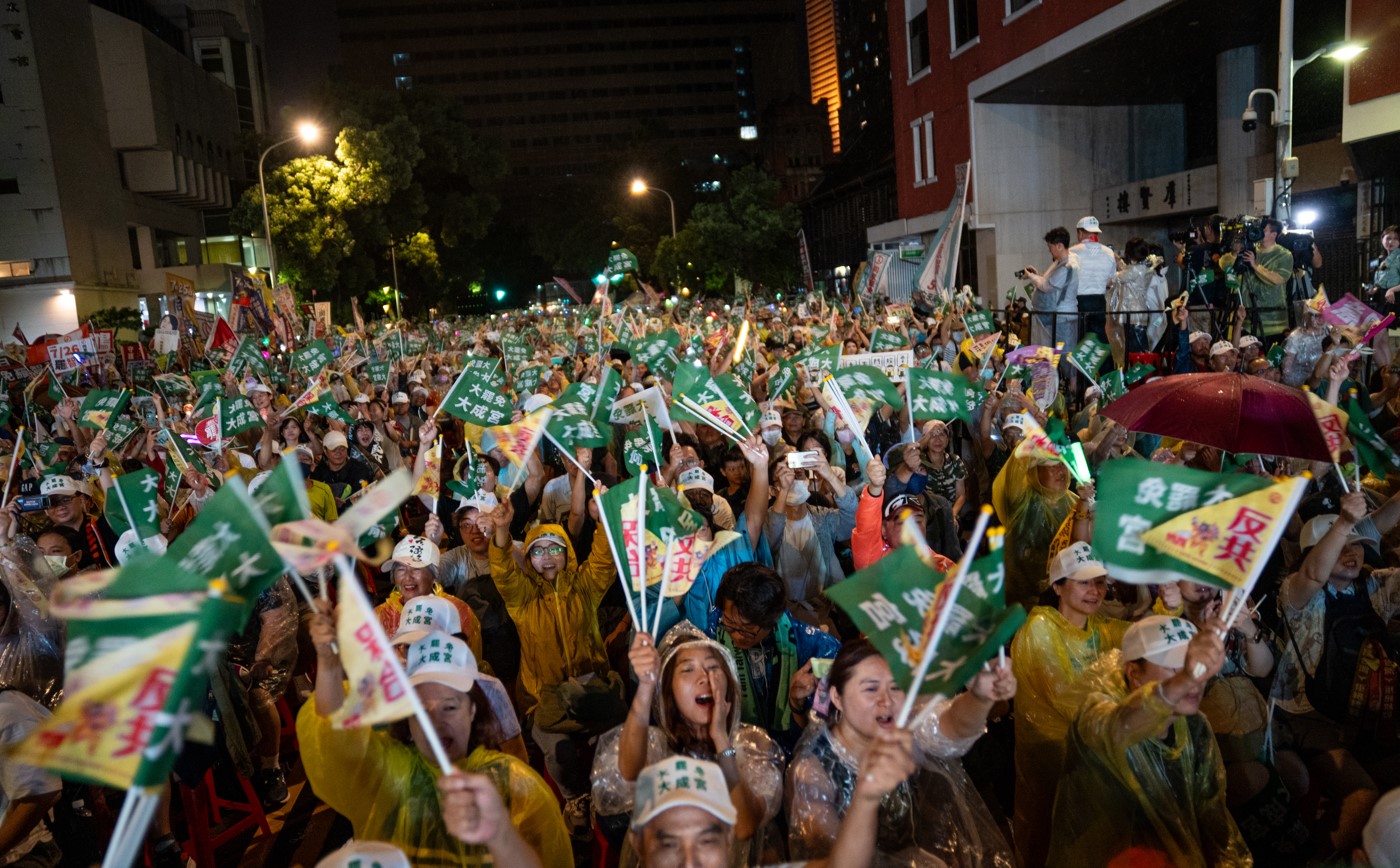The result of the 2025 recall was neither the root cause of Taiwan’s political turbulence nor a cure. What it did, through a procedurally complex democratic exercise, was focus attention, at home and abroad, on the open wounds in Taiwan’s democracy: the ties between local power brokers and China, the rise of populism, and external threats from Beijing — all of which endanger the foundations of both sovereignty and democracy. Picture source: KOKUYO, July 19, 2025, Wikipedia, https://zh.wikipedia.org/zh-tw/%E5%A4%A7%E7%BD%B7%E5%85%8D#.
Prospects & Perspectives No. 44
If the 2025 Recall is to Shape Taiwan’s Democratic History
By Min-yen Chiang
The full significance of Taiwan’s 2025 recall movement — for democratic development and sovereignty — will only emerge with time. Like past turning points, its meaning will depend on what follows, not just what happened.
Taiwan’s Push that Shifted Geopolitics
Viewed from 2025, the 2014 Sunflower Movement unfolded at the close of the U.S.’ engagement-era policy toward China. Even before Washington shifted course, Taiwanese citizens took the initiative to resist Beijing’s influence, reshaping the island nation’s political trajectory and helping lay the groundwork for future U.S. strategy in the first island chain.
The thaw in U.S.–China relations since the 1970s was long assumed to bring lasting peace. The 2010s proved otherwise. In Taiwan, China’s economic rise coincided with a media landscape eroded by Chinese capital, while business leaders — fearing retaliation — aligned with Beijing’s annexation agenda. Asymmetric dependence on the Chinese market distorted Taiwan’s economy, and even its semiconductor industry, the nation’s pride, was nearly drawn into Beijing’s Made in China 2025 plan.
In geopolitical terms, Taiwan’s civil society was a harbinger — confronting China’s global expansion before most. Soon after the Sunflower Movement, the United States redefined China as its top military rival, began economic decoupling, and watched Beijing intensify its export of authoritarian values.
In democratic terms, the Sunflower Movement generation — born after martial law, raised on direct elections and peaceful transfers of power — could not accept sovereignty erosion via the Kuomintang’s (KMT) authoritarian legacy. In 2014, they took to the streets, willing to pay the price to challenge entrenched political and economic injustice.
When Civic Power Confronts Local Political Decay
The 2025 recalls extended that spirit of mobilization. Yet U.S. think tank narratives often frame them as a miscalculation by President Lai Ching-te, faulting him for confronting rather than negotiating with the opposition. External observers also tend to reduce the recalls to a simple blue–green rivalry.
From an electoral perspective, party machinery still matters — the KMT’s victories proved that. But in KMT strongholds, civic groups gathered over 1.2 million signatures demanding the defense of sovereignty and constitutional order. They remained organizationally independent of the Democratic Progressive Party (DPP), signaling a sovereignty-driven movement beyond traditional partisan lines.
Many of these activists came from the Sunflower Movement and now hold key positions across society. They bring initiative and agency into public life, forming a deeper current renewing Taiwan’s democracy — and a force no mature party can afford to ignore.
Yet the recalls also exposed structural weaknesses in Taiwan’s democratic development. Unlike other authoritarian parties that were restructured or dissolved during democratization, the KMT remained within the democratic electoral system while continuing to uphold Chinese nationalist ideals. Today, despite a solidifying Taiwanese identity, KMT elites still send misleading messages abroad, framing public opinion in ways that, at times, seem to reflect Beijing’s nationalist views.
Three decades of democratization also left gaps in democratic defense at the local level. The DPP, born from the forces that once opposed authoritarianism, has not dismantled the KMT’s entrenched patron–client networks. Since 2016, it has concentrated resources in the central government, leaving local operations underdeveloped. Young political talent lacks support to build local power. Scarce resources and stagnant party culture often reinforce old patterns rather than create new ones.
This structural trap benefits Beijing. By penetrating local politics and aligning with local power brokers, China can erode the DPP’s central authority. Take Fu Kun-chi, the KMT caucus whip, for example. Once seen as a local politician, he now leads lawmakers to meet with the representative of the Chinese Communist Party (CCP) Politburo Standing Committee — potentially offering Beijing a more direct channel to influence Taiwan’s legislature. Furthermore, as caucus whip, Fu holds the power to command legislators, expand his influence, and is able to leverage his local base to further destabilize Taiwan’s democracy — as evidenced by the ongoing paralysis of the Constitutional Court.
Taiwan’s Democracy Under Multiple Strains
The Sunflower Movement set Taiwan’s civic activism on an enduring course: resisting China’s annexation. That call later echoed in Hong Kong’s 2019 anti–extradition protests, which entrenched rejection of Beijing’s “One Country, Two Systems” model.
In Taiwan, that thread never broke. Even during the 2025 mass recall, “resisting Chinese annexation” remained the unifying demand — reaching into the KMT’s traditional base and uniting Taiwan- and ROC-identity supporters under one nation-building narrative.
This marked a transitional phase in the discourse on Taiwan’s sovereignty within its democratic history. During the martial law era, that discourse centered on resisting the KMT’s domestic authoritarianism. Today, it has shifted to confronting external coercion from the PRC. In this transformation, the KMT’s role has changed from internal oppressor to at times an ostensible enabler of an external threat.
This change also exposed a deeper crisis. The Cold War legacy reminds us that the KMT was once tethered to the U.S.-led security framework, yet it is now binding itself — at least in the view of its critics — ever closer to the CCP. This alignment now puts it in irreconcilable conflict with Taiwan’s place in the liberal democratic camp.
The KMT, in its pursuit of power, has forged a close partnership with the smaller Taiwan People’s Party (TPP) and the brand of populism it represents. This alliance is set to deepen. The reasons are clear. After consecutive DPP terms, public dissatisfaction with the ruling party makes it easy for populists to inflame distrust of elites. U.S. trade policy, increasingly confrontational, risks undermining confidence in Taiwan–U.S. security ties. Meanwhile, disinformation has fractured Taiwan’s information environment, eroding political leaders’ ability to shape the national agenda.
These forces are not unique to Taiwan, but here they are more dangerous. The KMT–TPP axis does not merely offer an alternative coalition during the electoral process: public resentment, even if rooted only in dissatisfaction with domestic governance, can be interpreted as a backlash against the DPP’s firm rejection of China’s military threats — producing unintended diplomatic consequences.
Result Sealed, Meaning Still Contested
The result of the 2025 recall was neither the root cause of Taiwan’s political turbulence nor a cure. What it did, through a procedurally complex democratic exercise, was focus attention, at home and abroad, on the open wounds in Taiwan’s democracy.
Yet this recall mobilization revealed a new phase in civil society’s organizational capacity. It also exposed the unfinished business of Taiwan’s democratization: the ties between local power brokers and China, the rise of populism, and external threats from Beijing — all of which endanger the foundations of both sovereignty and democracy.
What comes next will determine its place in history. Civil society’s goals and effectiveness — and the DPP administration’s ability to dismantle these threats — will shape the verdict. A decade from now, the recall’s legacy will hinge on sustaining its momentum and confronting today’s clearly identified challenges.
(Chiang Min-yen is Young Advisor at the Taiwan Economic Democracy Union.)


